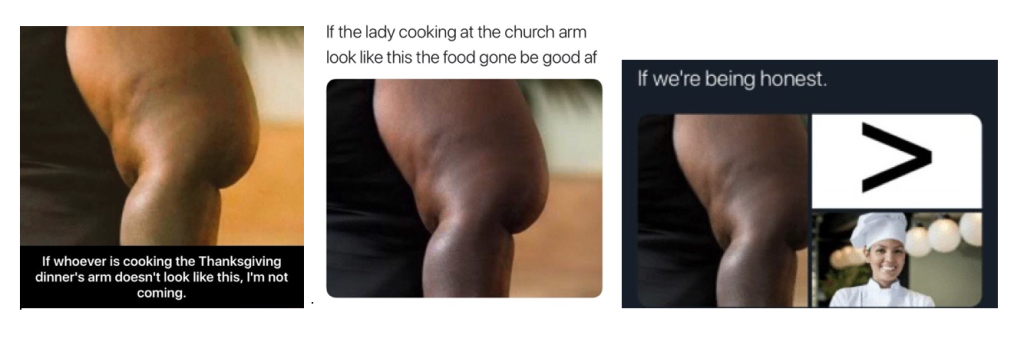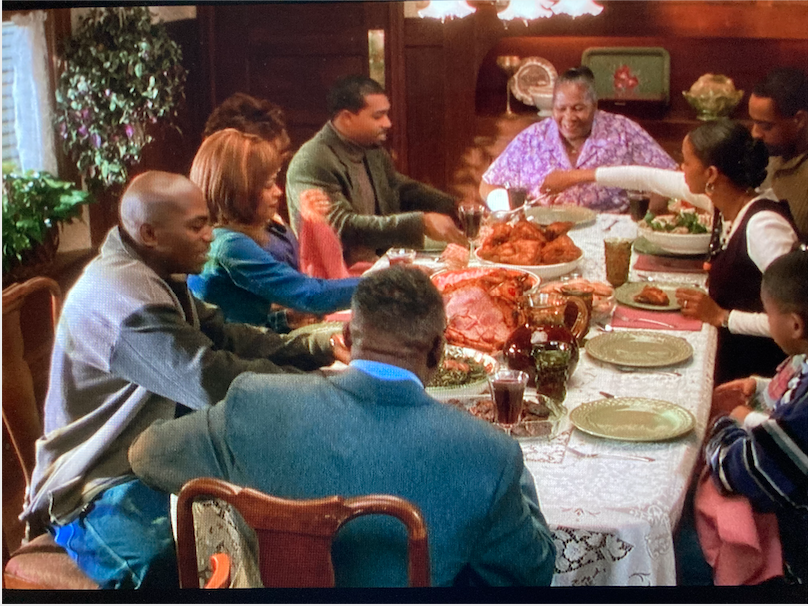“Big Momma Ya’ Arm!” is a 25-year running ‘joke’ within some Black American communities. The phrase comes from a film titled Soul Food which chronicles the trials of the Joseph family after the death of their matriarch, Mother (Big Mama) Joe. The film details the importance of foodways in Black communities throughout history and across time, and helped bring to mainstream the importance of Sunday Dinners in our cultural traditions. The name “Big Mama” was at one point common for matriarchs in Black American families, and while it might invoke a fat-bodied matriarch, that is not a prerequisite for use of the term. In the film, however, Big Mama is fat-bodied and diabetic. There is a moment in the film where Big Mama burns her arm on the stove while moving food around during cooking. The film implies that she has reduced blood flow because of her diabetes and, thus, reduced feeling in her arms and other limbs. Big Mama is unaware her arm is over an open flame until her grandson yells: “Big Mama Your Arm!” Ultimately, she dies from complications from surgery to have her leg amputated due to low blood circulation.
As a Black American, the histories and legacies of the transatlantic trafficking of African people and chattel slavery are bound up with my contemporary realities and that of members of the Black American community. One of my favorite things about Black Americans are our cultural productions as well as our ability to find laughter and humor even in the bleakest of circumstances. While humor in the face of trauma or as a means of resistance is important, the content of the humor can at times be rooted in the oppression and degradation of others. Fatphobia and sizeism is one such example. In this writing I hope to underscore connections between fatness, Blackness and humor the complexities of how they are brought to bear to both ridicule and revere fat Black bodies and food.
While the film takes a serious tone to the arc of Big Mama’s life and her death, the Black American community broadly has repurposed the phrase as an artifact of humor, and as such, have situated the phrase to mean someone or something who is being gluttonous, greedy, eating too much sugar/the wrong food, or simply, fat. For example, I searched twitter for the phrase and below are three tweets– with usernames/contexts/and certain language redacted – which convey how the phrase has been/can be used:
“Pic gave me “Big momma ya arm!” vibes. [laughing emoji] I’m currently 195 lbs and 8 months in” – was tweeted by a person who posted a selfie.
“3 starches, no veggies with fruit punch to drink. big momma ya arm” – the person is referring to a meal of macaroni and cheese, rice, mashed potatoes, and steak.
“big momma ya arm. (but I would eat the f*ck out of this)” the person is referring to a deep fried pop-tart with whipped cream, sprinkles, and a cherry on top.
As evidenced in the examples, the phrase “Big Momma Ya’ Arm” almost always has a food-related component. That is, despite the first example in which a pregnant woman uses the phrase to joke about herself and weight gain, the conflation is that to engage this type of food means one is likely unhealthy, usually fat, and at risk of diabetes, normally severe cases.
The complexity of this phenomenon is that there also tends to be a type of reverence, an admiration of, or expectation for, delicious Black American food from fat Black people, usually women. I turn to a different meme that some Black people have used in various online spaces and serves as a signal that good food is inevitable when a particular body – prepares it. Perhaps most interestingly is the image being of a fat arm, but instead of warning the person (Big momma ya arm!) the arm is celebrated for the food the arm/person might prepare for others. Below is an image that circulates semi-regularly, often around the holidays:

In these examples, while often said in some jest, the fat Black body is revered for the potential to create or prepare delectable Black American cuisine. For example, the mention of Thanksgiving and Church – recall Soul Food and the invocation of Sunday Dinners – harkens this sentiment to a particular Black food tradition; one would not expect a delicious Shepherd’s Pie from one of these arms. While my intention is not to make a broad-brush stroke on the Black American community and this issue, I am arguing that there may be perceived ambivalences at the nexus of Blackness, fatness, food, and humor, however these manifestations are likely connected to tensions between historical articulations of how Africans and their ascendants might think of fatness and food and how white supremacy has wreaked havoc on the ontologies and sensemaking of Black Americans around fatness and food.
Black and non-Black people have critiqued Black American soul food/southern diet. Often problematically re-termed as “slave food,” the histories of certain aspects of this diet are clearly connected to the lack of options enslaved people were given by slavers during chattel slavery. With these limited options, the enslaved tried to make the most appealing meal possible with undesirable parts of animals or plant-based options. As Professor of Health Policy Thomas LaVeist explains: “See, the traditional African-American Southern diet was really designed for survival […]. African-Americans were not able to access a balanced, nutritious diet during slavery and during Jim Crow. What they had was organ meats and parts of slaughtered animals that others didn’t eat, and greens they grew themselves. And what they did is take those scraps and turn it into what’s now an internationally renowned cuisine.”
While critiques of soul food indict Black bodies of all sizes, there is a particular proclivity to both celebrate and archetype fat Black bodies as arbiters of this food specifically – seemingly for the consumption of non-fat people (see the arm meme above) – while also disciplining fat Black bodies, ensuring they do not indulge the food too much themselves (Big Mama Ya’ Arm!). Manifestations of discipline along these lines are gendered in that fat Black women, femmes, and non-binary people are likely on the receiving end of both the jokes and the praise more readily.
As a Black scholar, I am interested in writing that engages the particularities of Blackness – even critique – that do not pathologize Blackness or perpetuate antiblackness. With this caveat I offer that despite the complexities I have presented, fatphobia still animates the phenomenon of reverence or degradation of fat Black bodies in relation to food as thin Black women do not receive the same vitriol, in the same ways. For example, Black women artists such as Saweetie (McDonalds), Megan Thee Stallion (Popeyes) and Mariah Carey (McDonalds) all inked deals with major fast food chains, and what each of these women have in common is that they are thin/straight sized. This reality is similar to past Black women food endorsements including Mary J. Blige (Burger King), Aretha Franklin (McDonald’s), and Patti LaBelle (McDonald’s).
While each of these examples were met with differing reactions by the community depending on the timing and other corresponding factors (Mary J. Blige, for example, faced backlash for her endorsement), the fact remains that Black women’s images have often been used to sell and promote food (including Aunt Jemima). And, in more contemporary terms, a fat Black woman would likely not be offered a similar deal or be celebrated for having one. This occurrence is connected to the histories and legacies of the Mammy archetype/stereotype prevalent in U.S. media and culture and connected to the racialized and gendered fatphobia Black women uniquely experience.
Black American communities have a shared experience that is connected to our histories and legacies of displacement, thereby attaching us perhaps more deeply to the traditions we created during and in the wake of the institution of slavery. Our love of food, our humor in the face of trauma, and our resilient nature are all aspects I have deep and profound appreciation for. Despite the reality of jokes about fat Black people – fat Black women specifically – I do believe that some Black American communities also hold affection for our Big Mommas, Big Papas, and fat-bodied loved ones. At the same time, love for fat Black bodies does not excuse or foreclose the reality of fatphobia and sizeism, and their harmful effects. Both things can be true, and this reality conveys the beautiful complexity of our communities, our food, our fatness, and our Blackness.
